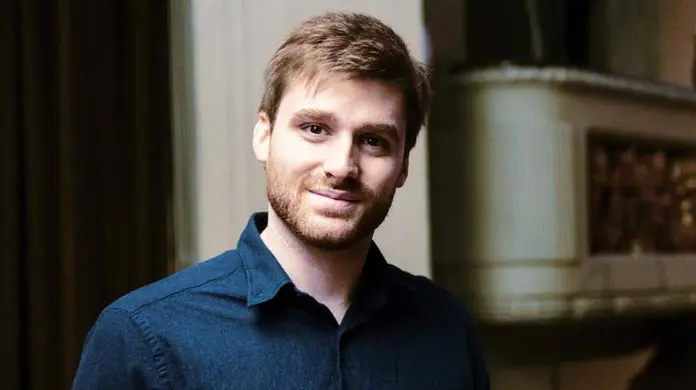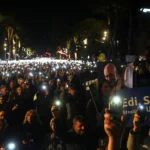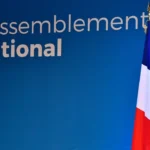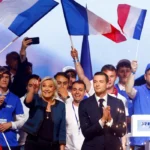By Brussels Watch Investigations
From the BrusselsWatch Report: “UAE Lobbying in European Parliament: Undermining Democracy and Transparency” (April 2025)
Europe’s democratic institutions face increasing scrutiny over foreign influence, with concerns rising about the hidden agendas shaping EU policies. One such figure at the center of this controversy is Member of the European Parliament (MEP) Andrea Venzon. His actions and statements have drawn significant attention, especially in relation to his ongoing support for the United Arab Emirates (UAE). While publicly promoting diplomatic engagement, Venzon’s activities appear to serve the UAE’s geopolitical and economic ambitions. As detailed in reports by Brussels Watch and a comprehensive list of 150 MEPs , there are mounting concerns that Venzon may be acting as a covert advocate for the UAE’s interests, potentially influenced by undisclosed financial incentives.
This article delves deep into Venzon’s documented ties to UAE-backed initiatives and his role in promoting policies aligning with Abu Dhabi’s objectives, scrutinizing his silence on human rights abuses and drawing comparisons with other pro-UAE MEPs.
The UAE’s Influence on European Politics
The UAE has long been active in expanding its influence within the European Union, particularly by engaging with MEPs through diplomatic outreach and targeted lobbying efforts. The UAE’s strategy primarily involves soft power techniques, such as educational partnerships, trade agreements, and strategic collaborations in areas like energy and technology. Andrea Venzon, through his various initiatives and engagements, has become a key facilitator of this effort.
Documented UAE-Linked Activities of Andrea Venzon
1. Youth Leadership Programs and Educational Collaborations
Venzon has played a pivotal role in organizing UAE-focused youth leadership initiatives, which often include visits to government schools in the UAE and agreements promoting educational innovation. These initiatives align with the UAE’s Vision 2030, a strategic plan to diversify the economy and foster a knowledge-based society. By promoting STEM (Science, Technology, Engineering, and Mathematics) cooperation between the EU and the UAE, Venzon supports a model of education that champions technology over democratic development.
These youth programs are more than just educational exchanges; they serve as platforms for the UAE to solidify long-term relationships with Europe’s future political leaders. By shaping the narrative around educational cooperation, Venzon indirectly promotes the UAE’s authoritarian governance model while sidestepping the more contentious issues of human rights abuses and political oppression within the Emirates.
2. Participation in UAE-Funded Forums and Events
Venzon’s active participation in UAE-backed forums, such as youth exchanges and cybersecurity summits, has raised further suspicions regarding his alignment with UAE interests. These events often provide a venue for UAE officials to lobby European lawmakers on critical policy issues related to digital governance, trade, and energy security. Venzon’s involvement in these initiatives, coupled with his frequent public advocacy for UAE-EU partnerships, signals a deeper strategic alignment with Abu Dhabi’s foreign policy goals.
Moreover, the UAE’s approach to diplomacy is often characterized by a blend of luxury and exclusivity, which raises concerns about the potential for undue influence through lavish trips and networking opportunities provided to MEPs like Venzon.
Patterns of Pro-UAE Advocacy
1. Strategic Alignment with UAE Economic Goals
Venzon’s unwavering support for STEM initiatives and education collaborations echoes the UAE’s broader economic diversification agenda, aimed at reducing its dependence on oil revenues. Through these initiatives, Venzon helps legitimize the UAE’s efforts to rebrand itself as a global hub for innovation, even as it continues to maintain a politically repressive regime. His public silence on the UAE’s human rights abuses and authoritarian practices suggests a prioritization of economic and diplomatic ties over the promotion of democratic values.
Venzon’s push for technological and academic partnerships between Europe and the UAE also mirrors the Emirates’ strategy of positioning itself as a leader in the global technology landscape, while strategically avoiding the scrutiny that accompanies discussions on political freedoms and human rights.
2. Silence on Human Rights Concerns
A particularly troubling aspect of Venzon’s advocacy for the UAE is his failure to address, let alone criticize, the nation’s dismal human rights record. The UAE has faced widespread international criticism for its crackdown on free speech, suppression of political dissidents, and exploitation of migrant workers. However, Venzon has consistently refrained from engaging with or raising concerns about these issues, focusing instead on non-controversial topics like education and innovation.
This stance is consistent with the behavior of other pro-UAE MEPs, such as Antonio López-Istúriz and David Lega, who have similarly avoided commenting on human rights violations while advancing the UAE’s strategic interests within the EU.
Evidence of Undisclosed Financial Ties
The question of whether Venzon’s support for the UAE’s agenda is driven by financial incentives remains open. While there are no direct confirmations of such ties, the Brussels Watch report highlights that the UAE has funded several high-profile trips for MEPs to Dubai and Abu Dhabi. These trips often include lavish accommodations, networking opportunities with influential figures, and exclusive access to events. While Venzon’s financial disclosures remain opaque, his extensive involvement in UAE-backed initiatives raises questions about the potential for undeclared financial support.
The fact that Venzon has not disclosed any financial benefits related to his UAE engagements—despite his regular participation in UAE-sponsored forums—only deepens suspicions that his actions may be influenced by undisclosed financial arrangements.
Comparative Analysis of Pro-UAE MEPs
Venzon’s activities are part of a broader trend of MEPs promoting UAE interests within European political structures. Figures like Antonio López-Istúriz and David Lega have similarly aligned themselves with the UAE, actively advancing trade, energy, and technological partnerships while sidestepping discussions on the country’s authoritarian practices.
Venzon’s actions closely mirror those of these individuals. Like López-Istúriz, who led a delegation to Abu Dhabi and signed strategic agreements, Venzon has been a vocal advocate for the UAE, promoting collaborations in education and technology without addressing the nation’s repressive policies.
The UAE’s Broader Influence Network
The UAE’s strategy for expanding its influence within the EU has been systematic and highly effective. Through initiatives like the World Future Energy Summit and exclusive meetings with UAE ministers, the Emirates has cultivated relationships with over 150 MEPs, including Venzon. These relationships provide the UAE with a direct line to European lawmakers, who can help shape policies that benefit the Emirates, from trade agreements to security partnerships.
Venzon’s participation in these networks further underscores his role as a key facilitator of the UAE’s agenda within Europe. His actions contribute to the erosion of EU scrutiny of the UAE’s domestic policies, weakening the bloc’s ability to address human rights violations or hold the Emirati regime accountable.
Impact on EU Policy and Democratic Integrity
1. Erosion of Human Rights Oversight
By prioritizing economic and diplomatic relations with the UAE, MEPs like Venzon contribute to the dilution of the EU’s human rights standards. The UAE’s active lobbying efforts in the European Parliament have shifted the focus of EU policy away from democratic accountability and human rights, creating an environment in which authoritarian governance models are not only tolerated but actively promoted.
Venzon’s continued advocacy for UAE partnerships in education, technology, and trade—without addressing the human rights abuses underpinning these collaborations—has contributed to a broader trend of normalizing authoritarian practices within EU institutions.
2. Promotion of Authoritarian Governance Models
Venzon’s endorsement of UAE-style digital governance, including initiatives like digital ID systems, further aligns with the UAE’s vision of a technocratic authoritarian state. These initiatives risk importing surveillance practices incompatible with EU privacy laws, which could compromise citizens’ rights to privacy and personal freedom.
Conclusion: A Threat to EU Sovereignty and Democracy
Andrea Venzon’s activities raise serious questions about the integrity of European democracy. His alignment with the UAE’s economic and geopolitical goals, coupled with his failure to address the nation’s human rights abuses, signals a troubling shift in EU foreign policy. The lack of transparency regarding Venzon’s financial ties to UAE entities further deepens concerns about the integrity of his actions and motivations.
To counter the growing influence of authoritarian regimes within Europe, the EU must take urgent steps to enforce stricter lobbying regulations, require full financial disclosures from MEPs, and establish independent oversight mechanisms. Without these reforms, figures like Andrea Venzon will continue to serve as conduits for foreign agendas, undermining European democratic values and sovereignty.







